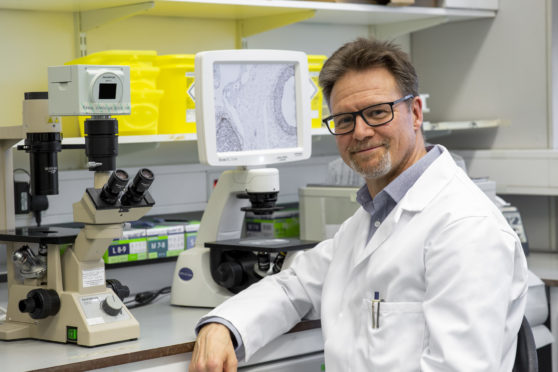Aberdeen University scientists have created a new drug that could help people with prostate cancer.
Professor Iain McEwan said the work, carried out in collaboration with Strathclyde University, could have a “huge impact” in tackling the disease which currently kills 30 men in Britain every day.
He believes the creation of a new drug could significantly reduce that grim statistic and has spoken about how he and his colleagues have carried on working despite Covid-19.
Prof McEwan, who has been in Aberdeen since 1997, is leading the project to explore new methods of attacking treatment-resistant cancer.
His pioneering work is being supported by the charity Prostate Cancer Research Centre (PCRC), which awarded him a grant of nearly £390,000 towards the end of last year.
The project has brought together research teams at Aberdeen and Strathclyde Universities in conjunction with a local bio-pharmaceutical company, Elasmogen Ltd.
Prof McEwan said: “Having started in November, we are six months into the venture. Before lockdown, we were making good progress and we had had generated a lot of data on the smaller drugs.
“The chemical structure of a drug affects its activity and we had started to get some really good insights into that, working with our collaborators Dr Craig Jamieson and his group in Strathclyde, when we went into lockdown and were told to plan for not being able to get into the lab for three months.
“However, because we had generated so much data, we were able to keep going with the analysis working from home.
“We’ve also spent some time doing what we call ‘in silico’ analysis, where we use advanced software to predict how chemicals will behave.
“We have also written a review on how to make a new drug for prostate cancer, looking at the chemistry, biology and clinical aspects you need to consider, so that we can make our multi-disciplinary knowledge widely available to the rest of the scientific community.
“We feel our work could have a huge impact for the public, as prostate cancer affects so many families, and we were determined to keep going throughout the lockdown.”
Prof McEwan and Dr Jamieson attended PCRC’s first Meet the Scientists event in London earlier this year where got the chance to speak to patients, their family members, and the charity’s supporters.
It is hoped a similar event could be held in Aberdeen in the future.
